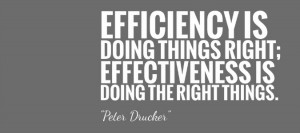
8 Practices of The Effective Executive
Drucker’s 2004 article for the Harvard Business Review, What Makes an Effective Executive? still holds weight today – for leaders, senior executives and even for middle managers. Even though the CEOs he compares in the article are considerably different from one another, they all had eight practices in common. Here’s what Drucker’s article recommends that you and your staff do to pursue success:
Want To Learn More?
Contact Dwight today for a complimentary conversation on your organization and how your managers can improve their overall effectiveness.
Ask what needs to be done: Get the knowledge you need by asking what needs to be done, and take the questions seriously. Once you know the to-do list, set priorities.
Ask what’s right for the enterprise: Don’t focus on what’s right for individuals (i.e. owners, investors, employees or customers.) What is right for the organization as a whole isn’t always right for individual stakeholders.
Develop action plans: Set a plan that specifies results and constraints compatible with the organization’s goals. Revise your plan often to reflect new opportunities.
Take responsibility for actions: Ensure each decision specifies the accountable individual(s) and the deadline. Outlines whom it affects and whom to keep updated and informed.
Take responsibility for communicating: Make sure to clearly explain your action plan and information needs. Share your plan with your superiors, subordinates, and peers and let them know what you expect of each person.
Embrace change: Don’t treat change as a threat. Instead, exploit opportunities and explore changes inside and outside of your organization (technologies, marketplace innovations) that will benefit your enterprise.
Run productive meetings: Clearly articulate the purpose of the meeting and terminate it once you have accomplished it. Follow up with a meeting summary and include new assignments and deadlines.
Say “we” not “I”: To get the best results, always put your organization’s needs ahead of your own. You cannot share or delegate most of your responsibilities but you have that authority because you have the trust of the organization.
Inspired by Effective Principles
Inspired by Drucker’s work, we used the eight characteristics combined with leading thinking from many others to create the Five Requirements of Effective ManagersTM. These five requirements, implemented within the context set by Drucker, are a framework for all managers that want to be effective in their work. These are not nice-to-do’s; they are required for every manager that is serious about doing her or his managerial work:
- Plan: Develop a plan that is a subset of your manager’s plan, and that links all the way back to the organization’s strategic goals.
- Do: For those things that must be done to execute your plan, decide that work which only you, in your position, with your capability, can do, and decide when and how you will do it.
- Set Context and Boundaries: Provide context to your team as a whole and to each team member individually to guide their decision-making so they are consistent with your plan and the organization’s priorities.
- Delegate: Decide which work must be done by each team member so that in combination their work and yours will lead to the successful execution of your plan, and specifically delegate those things which each of them is specifically accountable for over and above their ongoing operational work.
- Create Feedback Loops: Create feedback loops between yourself and your team, yourself and each team member, managers in other parts of the organization, and relevant community members.
Peter Drucker’s theories in regards to management offer many pertinent insights into the habits and responsibilities of highly effective leaders and managers. By working with Drucker’s research, we created a manager-specific outline for effectiveness. Managers should work to ensure that they embody all five traits to ensure effectiveness for themselves, their direct reports, and for the organization overall.





